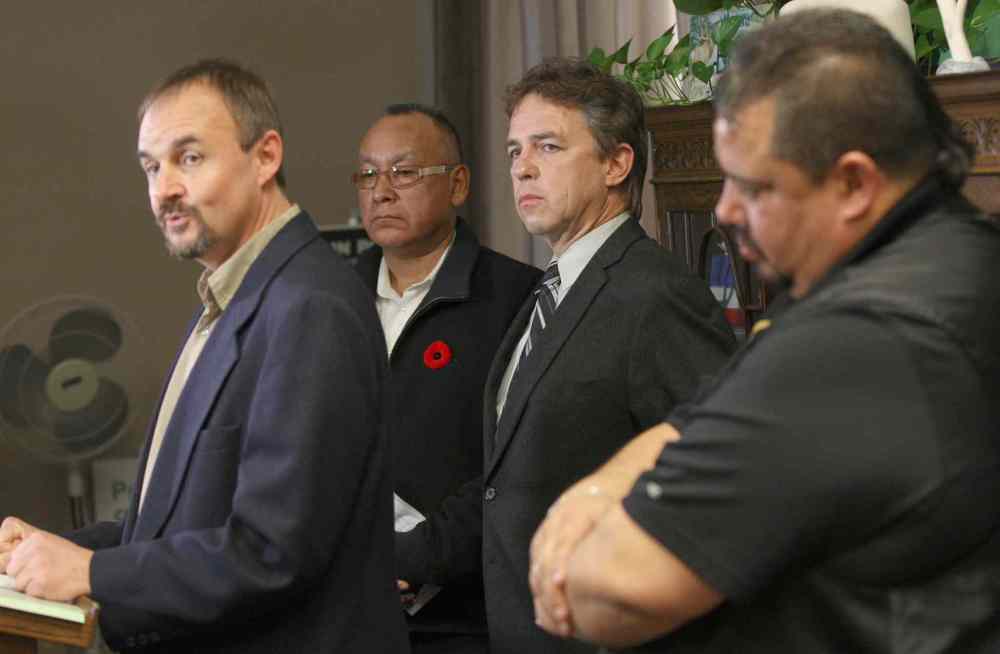Province quick to review fisheries after scathing watchdog report
Advertisement
Read this article for free:
or
Already have an account? Log in here »
To continue reading, please subscribe:
Monthly Digital Subscription
$0 for the first 4 weeks*
- Enjoy unlimited reading on winnipegfreepress.com
- Read the E-Edition, our digital replica newspaper
- Access News Break, our award-winning app
- Play interactive puzzles
*No charge for 4 weeks then price increases to the regular rate of $19.00 plus GST every four weeks. Offer available to new and qualified returning subscribers only. Cancel any time.
Monthly Digital Subscription
$4.75/week*
- Enjoy unlimited reading on winnipegfreepress.com
- Read the E-Edition, our digital replica newspaper
- Access News Break, our award-winning app
- Play interactive puzzles
*Billed as $19 plus GST every four weeks. Cancel any time.
To continue reading, please subscribe:
Add Free Press access to your Brandon Sun subscription for only an additional
$1 for the first 4 weeks*
*Your next subscription payment will increase by $1.00 and you will be charged $16.99 plus GST for four weeks. After four weeks, your payment will increase to $23.99 plus GST every four weeks.
Read unlimited articles for free today:
or
Already have an account? Log in here »
Hey there, time traveller!
This article was published 09/11/2015 (3672 days ago), so information in it may no longer be current.
The Selinger government has promised a “comprehensive review” of the province’s fisheries after a watchdog group said it would urge consumers to boycott fish from Manitoba’s three largest lakes.
Conservation and Water Stewardship Minister Tom Nevakshonoff announced economist Harold Westdal will facilitate the review, which will begin later this month.
Westdal’s report is expected next September. Nevakshonoff said a budget for the review has not yet been set.

Manitoba reacted swiftly to the assessment that fisheries at the province’s three largest lakes — Winnipeg, Manitoba, and Winnipegosis — are among the worst-managed in the world.
The appraisal was made by Monterey, Calif.,-based Seafood Watch and its Vancouver partner, SeaChoice.
The recommendation consumers avoid fish from these lakes could have dire consequences for Manitoba’s economy and rural communities around the lakes. An estimated 85 per cent of the $22 million worth of fish caught in Manitoba every year is exported to markets in the U.S. and Europe, where buyers are beginning to give preferential treatment to fisheries certified as ecologically sound.
On Monday, Manitoba appeared to accept the outside analysis without question.
“We take their advice wholeheartedly, yes,” Nevakshonoff said.
“Today we are announcing we are doubling down on our efforts to work even harder to ensure that Manitoba’s fish stocks are well-managed to assure the long-term stability of the resources,” he told a news conference.
Accompanied by two leaders of First Nations and an environmentalist, Nevakshonoff promised to work with commercial fishers, aboriginal communities and groups such as the Lake Friendly Stewards Alliance in developing a plan to protect Manitoba’s fishery.
Norway House First Nation Chief Ron Evans said members of a fishing co-op in his community have noted valued species such as whitefish and pickerel have been declining in Lake Winnipeg. “The co-op is very committed to establishing conditions on the lake that are recognized internationally. It is very important that we act now,” he said.
An official with the Freshwater Fish Marketing Corp., which buys and markets all freshwater fish caught commercially in Manitoba, Alberta and the Northwest Territories, did not return a request for comment Monday.
Seafood Watch claims Manitoba’s fisheries suffer from a poor understanding of stock sizes and catch rates, with no catch limits for some species, no harvest-control rules and an “unenforceable” multi-species system that lumps walleye — locally known as pickerel — with sauger and whitefish. Its assessment also claims “many fish stocks have collapsed or are severely depleted” in Manitoba.
Manitoba commercial fishers vehemently reject this claim, arguing fish stocks in the province’s biggest lakes are healthy.
In an email Monday, commercial fisher Kris Isfeld, a spokesman for hundreds of Lake Winnipeg fishers, said it was news to him the province was embarking on its review. He asked a reporter to send him details.
Progressive Conservative conservation and water stewardship critic Shannon Martin said he’s not surprised Manitoba’s commercial fishery has received a black eye, and he placed the blame squarely on the Selinger government.
Martin said the government has cut almost $18.5 million from the Conservation and Water Stewardship Department over the last three years. A big chunk of that has come from fisheries and water science, he said.
“How can you make sound decisions if you don’t actually have sound data?” Martin said.
Nevakshonoff said his department has supported an effort to introduce eco-certification of fisheries in various Manitoba lakes. The province has held 50 consultation meetings and spent $480,000 toward that aim.
Last year, Waterhen Lake, east of Lake Winnipegosis, achieved eco-certification from the Marine Stewardship Council, an international body. It was only the second freshwater lake in the world to achieve such status, the province said.
Skownan First Nation Chief Cameron Catcheway said Monday he hopes the work that went into obtaining the designation will put money in fishers’ hands.
“Hopefully, we get a premium price for our fish,” he said.
History
Updated on Monday, November 9, 2015 7:03 PM CST: write-through
Updated on Monday, November 9, 2015 10:09 PM CST: Write-through


